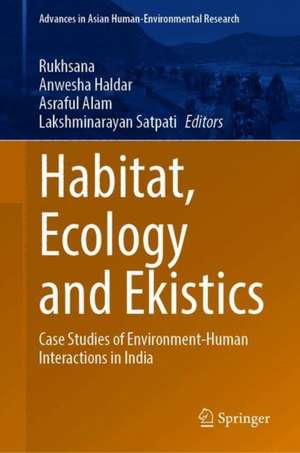Habitat, Ecology and Ekistics: Case Studies of Human-Environment Interactions in India: Advances in Asian Human-Environmental Research
Editat de Rukhsana, Anwesha Haldar, Asraful Alam, Lakshminarayan Satpatien Limba Engleză Hardback – 21 oct 2020
Din seria Advances in Asian Human-Environmental Research
- 18%
 Preț: 956.81 lei
Preț: 956.81 lei - 20%
 Preț: 560.01 lei
Preț: 560.01 lei - 18%
 Preț: 890.54 lei
Preț: 890.54 lei - 15%
 Preț: 645.47 lei
Preț: 645.47 lei - 24%
 Preț: 725.19 lei
Preț: 725.19 lei - 18%
 Preț: 948.16 lei
Preț: 948.16 lei - 18%
 Preț: 787.78 lei
Preț: 787.78 lei - 15%
 Preț: 640.37 lei
Preț: 640.37 lei - 15%
 Preț: 646.43 lei
Preț: 646.43 lei - 15%
 Preț: 665.58 lei
Preț: 665.58 lei - 18%
 Preț: 948.16 lei
Preț: 948.16 lei - 15%
 Preț: 635.31 lei
Preț: 635.31 lei - 20%
 Preț: 578.30 lei
Preț: 578.30 lei - 15%
 Preț: 647.73 lei
Preț: 647.73 lei - 18%
 Preț: 1029.13 lei
Preț: 1029.13 lei - 15%
 Preț: 640.06 lei
Preț: 640.06 lei - 18%
 Preț: 950.52 lei
Preț: 950.52 lei - 18%
 Preț: 1575.88 lei
Preț: 1575.88 lei - 15%
 Preț: 642.18 lei
Preț: 642.18 lei - 18%
 Preț: 896.08 lei
Preț: 896.08 lei - 15%
 Preț: 639.41 lei
Preț: 639.41 lei - 15%
 Preț: 645.28 lei
Preț: 645.28 lei - 15%
 Preț: 641.03 lei
Preț: 641.03 lei - 18%
 Preț: 954.62 lei
Preț: 954.62 lei - 15%
 Preț: 642.51 lei
Preț: 642.51 lei - 15%
 Preț: 644.95 lei
Preț: 644.95 lei - 18%
 Preț: 1023.74 lei
Preț: 1023.74 lei - 18%
 Preț: 954.31 lei
Preț: 954.31 lei - 15%
 Preț: 640.55 lei
Preț: 640.55 lei - 15%
 Preț: 644.18 lei
Preț: 644.18 lei - 15%
 Preț: 641.71 lei
Preț: 641.71 lei - 18%
 Preț: 938.21 lei
Preț: 938.21 lei - 15%
 Preț: 644.18 lei
Preț: 644.18 lei
Preț: 788.72 lei
Preț vechi: 961.85 lei
-18% Nou
Puncte Express: 1183
Preț estimativ în valută:
150.97€ • 164.04$ • 126.90£
150.97€ • 164.04$ • 126.90£
Carte disponibilă
Livrare economică 01-15 aprilie
Preluare comenzi: 021 569.72.76
Specificații
ISBN-13: 9783030491147
ISBN-10: 3030491145
Pagini: 333
Ilustrații: XXIII, 333 p. 99 illus., 85 illus. in color.
Dimensiuni: 155 x 235 mm
Greutate: 0.64 kg
Ediția:1st ed. 2021
Editura: Springer International Publishing
Colecția Springer
Seria Advances in Asian Human-Environmental Research
Locul publicării:Cham, Switzerland
ISBN-10: 3030491145
Pagini: 333
Ilustrații: XXIII, 333 p. 99 illus., 85 illus. in color.
Dimensiuni: 155 x 235 mm
Greutate: 0.64 kg
Ediția:1st ed. 2021
Editura: Springer International Publishing
Colecția Springer
Seria Advances in Asian Human-Environmental Research
Locul publicării:Cham, Switzerland
Cuprins
Part I - Habitat and Environmental Issues of Human Concerns.- Chapter 1: Habitat, Ecology and Ekistics: An Overview.- Chapter 2: Contemporary Environmental Issues - The Indian Perspective.- Chapter 3: Rainfall Insight in Bangladesh and India: Climate Change and Environmental Perspective.- Chapter 4: Habitat linkages for Asian Elephants in Central India.- Chapter 5: Environmental Pollution and Municipal Solid Waste Management in India.- Chapter 6: Assessment of Carbon Footprint across Urban Households in Kolkata.- Part II - Ekistics and Ecology of Social Environment.- Chapter 7: Dwelling in Decay: Analyzing the Spatio-Psychological Paradigm of Dilapidated Dwellings in Kolkata.- Chapter 8: Spatio-temporal Transformation of Urban Built-up Areas for Sustainable Environmental Management in Selected Cities of West Bengal.- Chapter 9: Population pressure and Urban Sprawl in Kolkata Metropolitan Area.- Chapter 10: Socio-ecological niche of Tribes of Purulia district, West Bengal.- Chapter 11: Gajan – A Cultural Heritage of the Marginalized People in Kulpi CD Block, West Bengal. –Part III - Hazards and Environmental Management for Sustainable Development.- Chapter 12: Environmental Vulnerability and Displacement Due to Land Erosion: Selected Case Studies in West Bengal, India.- Chapter 13: Flood Frequency Analysis and its Management in Selected Part of Bardhaman District, West Bengal.- Chapter 14: Spatio-temporal Extent of Agricultural Drought over Western Part of West Bengal.- Chapter 15: Drought induced Human Mobility in Purulia District of West Bengal.- Chapter 16: Traditional Water Management System and Agricultural Sustainability in a Himalayan Foothill Village of Assam, India.- Chapter 17: Management of Wastelands in Chotanagpur Plateau Fringe: Lessons from Village Level Experience in Birbhum District of West Bengal, India.- Chapter 18: Eyeing Sustainability: Electronic Waste Handling in Kolkata.
Notă biografică
Dr. Rukhsana is an Assistant Professor in the Department of Geography at Aliah University, India.
Dr. Anwesha Haldar is an Assistant Professor (DDE) in the Department of Geography at Rabindra Bharati University, India.
Dr. Asraful Alam is a Postdoctoral Fellow in the Department of Geography at University of Calcutta, India.
Prof. Lakshminarayan Satpati is Professor of the Department of Geography and Director of Human Resource Development Center at University of Calcutta, India.
Textul de pe ultima copertă
This volume uses an innovative and interdisciplinary approach to assess various issues resulting from human-environment interactions in relation to sustainable development. The book encompasses theoretical and applied aspects, using both thematic and regional case studies from India, to highlight the impact of human-environment interactions at various spatio-temporal scales, with each study focusing on a particular anthropogenic issue, particularly in an Indian context. The book's three focal themes (e.g. habitat linkages, ekistics and social ecology, hazard and environmental management) elaborate the essential components of human-environment interactions with nature, its impact on the surrounding natural and social environments, and management techniques through research innovations. Readers will learn how maladjustments, disturbances and disasters are often inevitable byproducts of human-environment systems, and what conceptual and practical strategies can be applied towards sustainable coexistence. The book will be of interest to students, academics and policymakers engaged in environmental management, human-environment interactions and sustainable development.
Caracteristici
Initiates new approaches on issues of human-environment interactions in relation to sustainable development Offers case studies from India analyzing human impacts on natural and social environments Discusses hazards and disturbances that are byproducts of human-environment systems
